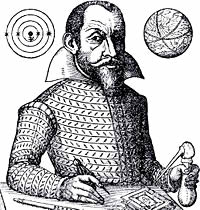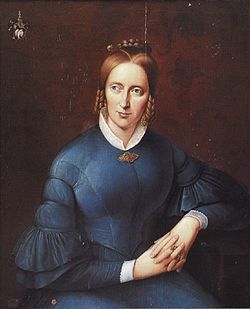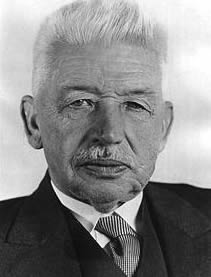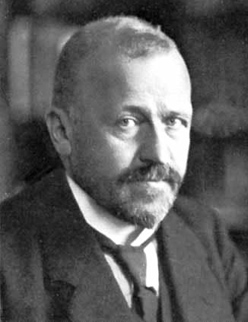January 10, 1573
Birth of Simon Marius (1573-1624) in Gunzenhausen, Germany. Marius was the astronomer who named the four largest moons of Jupiter. He was one of the first astronomers to use a telescope, the first to report the spiral nebula in Andromeda and one of the first to note sunspots.
January 10, 1785
Death of Heinrich Wilhelm Stiegel in Charming Forge, PA (born near Cologne, Germany). Stiegel immigrated to Philadelphia in 1750. There he built an ironworks and soon expanded to a second ironworks in Lancaster. At the boycott of British imports he expanded his manufacture of window glass and bottles at a company he founded called the American Flint Glassworks. He was highly successful and became known for his mansions, servants and high life style. As economic conditions deteriorated with the approach of the war with England, however, his fortunes declined. By 1774 he was in debtors prison.
January 10, 1797
Birth of Annette von Droste-Hülshoff (1797-1848) in Hülshoff, Germany. She was one of the leading writers of the 19th century. She is most noted for her poetry, Gedichte (1838) and Das geistliche Jahr (1851). Her novella, Das Judenbuch (1842) is also highly respected.
January 10, 1847
Birth of Jacob Schiff in Frankfurt am Main, Germany. Schff immigrated to the United States in 1865 where he would become one of America’s leading railroad bankers. He was the head of the investment bank, Kuhn, Loeb and Company. His financial backing led to Edward Harriman taking control of the Union Pacific Railroad. He later backed Harriman in his struggle with James J. Hill and J. P. Morgan for control of the Northern Pacific Railroad. In his later years he became a philanthropist and was a major donor to Harvard and Cornell universities and to the American Red Cross.
January 10, 1866
Birth of Karl Aschoff (1866-1942) in Berlin. Aschoff was a pathologist who had studied at the University of Bonn and taught at the University of Freiburg. He discovered phagocytes (cells which ingest foreign substances) and Aschoff’s bodies (nodules in the heart related to the rheumatic process).
January 10, 1880
Birth of Grock (stage name of Charles Wettach) in Reconvilier, Switzerland. Grock was a circus clown and later a stage comedian of great popularity. His autobiography, Die Memoiren des Königs der Clowns, was published in 1956.
January 10, 1890
Death of Johann Joseph Ignaz von Döllinger in Munich, Germany. Döllinger was a Roman Catholic priest, a professor of canon law and a church historian in Munich. When the First Vatican Council of 1869-1870 defined the infallibility of the pope Döllinger could not accept the doctrine. He joined the Altkatholiken who broke with the Vatican after the council. His writing on the subject of papal infallibility was listed on the Roman Catholic Index of Forbidden Books and he was excommunicated in 1871.
January 10, 1920
The Versailles Treaty takes force.
January 10, 1949
Death of Erich Dagobert von Drygalski in Königsberg, Germany (now in Russia). A geographer and glaciologist, Drygalski led an expedition to the Antarctic from 1901-1903 and published the results of the findings in Deutsche Südpolar-Expedition 1901-1903. The 20 volume work appeared between 1905 and 1931. Drygalski was a professor at the University of Munich.
Back to Today in German History Calendar











